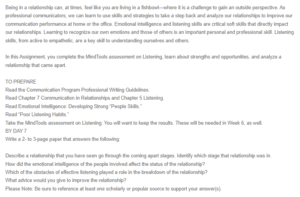Discussion – Relationship Analysis
About two years ago, I saw a relationship go through the various stages of coming apart. A close friend of mine, David, had started dating a couple who happened to have been together for three years. Everything seemed to work out well at first, but a few months in, the relationship entered the coming apart stages. Accordingly, Jose, one of the partners in the relationship, felt that David and Jane, the other partner, had become closer. He felt left out. Jose had brought up the issue, saying he was not spending as much time with either or both of them as David and Jane spent time with each other. A short while after the issue was brought up, Jose started by differentiating. He drew boundaries (reboundaries) (University of Minnesota, n.d.-b) in his life to make it look like it was before David joined them. One of the signs of differentiating I noticed was when Jose started using terms like my girlfriend or my friends, yet initially, he would use terms integrating words like “ours” and “we.” In addition, Jose also started taking Jane out while excluding David from their dates, which was not the case before.
These actions went on for a while before David felt that he was not compatible with the couple anymore, and he ended up breaking up with them. After observing how this relationship started and ended, I would conclude that the emotional intelligence of the individuals involved in this relationship negatively affected the relationship status. One of the domains of emotional intelligence is having a deep understanding of the emotions and needs of others. Both David and Jane seemed to lack this domain when it came to the needs of Jose, even when he brought up the matter. Eventually, Jose had to take the necessary steps he felt he had to in order to save his relationship with Jane. Suppose both David and Jane had this kind of emotional intelligence, they would have been able to provide Jose with his emotional needs so that he would not have felt left out, making it a win-win for everyone involved.
Further, I feel that Jose was a bit jealous because David and Jane seemed to have more in common, which made it easier for them to get along. However, when it comes to people with emotional intelligence, they can manage their self-emotions or rather have self-control, which allows them not to be overwhelmed by emotions and instead approach the problem logically. With such a capability, Jose would have taken a better way to solve his problem of being left out rather than cutting out one of his partners. Cognitive barriers, among the various obstacles to effective listening (University of Minnesota, n.d.-a), played a significant role in the breakdown of the relationship. Cognitive barriers to effective listening are numerous; they include selective attention, information overload, filtering and insulated listening, stage hogging, and pseudo-listening (Executive Advisory, n.d.).
My advice to help improve the relationship would have been for them to practice effective communication with each other. Communication played a huge role in the coming apart of the relationship, and if these issues were addressed, better results would have been experienced. Jose should improve on how he communicates his feelings, thoughts, and fears, among others, instead of being avoidant or passively aggressively doing it. On the other hand, David and Jane should improve their listening skills to not only hear what is being said but to pick up on the nonverbal messages as well.
References
Executive Advisory. (n.d.). Poor listening habits. The Executive Advisory. http://www.theexecutiveadvisory.com/toolkit/listening/poor-listening-habits/
University of Minnesota. (n.d.-a). Chapter 5: Listening. In Communication in the Real World: An Introduction to Communication Studies. M. Libraries. https://open.lib.umn.edu/communication/part/chapter-5-listening/
University of Minnesota. (n.d.-b). Chapter 7: Communication in relationships. In Communication in the Real World: An Introduction to Communication Studies. M. Libraries. https://open.lib.umn.edu/communication/part/chapter-7-communication-in-relationships/
ORDER A PLAGIARISM-FREE PAPER HERE
We’ll write everything from scratch
Question

Discussion – Relationship Analysis
Being in a relationship can, at times, feel like you are living in a fishbowl—where it is a challenge to gain an outside perspective. As professional communicators, we can learn to use skills and strategies to take a step back and analyze our relationships to improve our communication performance at home or the office. Emotional intelligence and listening skills are critical soft skills that directly impact our relationships. Learning to recognize our own emotions and those of others is an important personal and professional skill. Listening skills, from active to empathetic, are a key skill to understanding ourselves and others.
In this Assignment, you complete the MindTools assessment on Listening, learn about strengths and opportunities, and analyze a relationship that came apart.
TO PREPARE
Read the Communication Program Professional Writing Guidelines.
Read Chapter 7 Communication in Relationships and Chapter 5 Listening.
Read Emotional Intelligence: Developing Strong “People Skills.”
Read “Poor Listening Habits.”
Take the MindTools assessment on Listening. You will want to keep the results. These will be needed in Week 6, as well.
BY DAY 7
Write a 2- to 3-page paper that answers the following:
Describe a relationship that you have seen go through the coming apart stages. Identify which stage that relationship was in.
How did the emotional intelligence of the people involved affect the status of the relationship?
Which of the obstacles of effective listening played a role in the breakdown of the relationship?
What advice would you give to improve the relationship?
Please Note: Be sure to reference at least one scholarly or popular source to support your answer(s).

